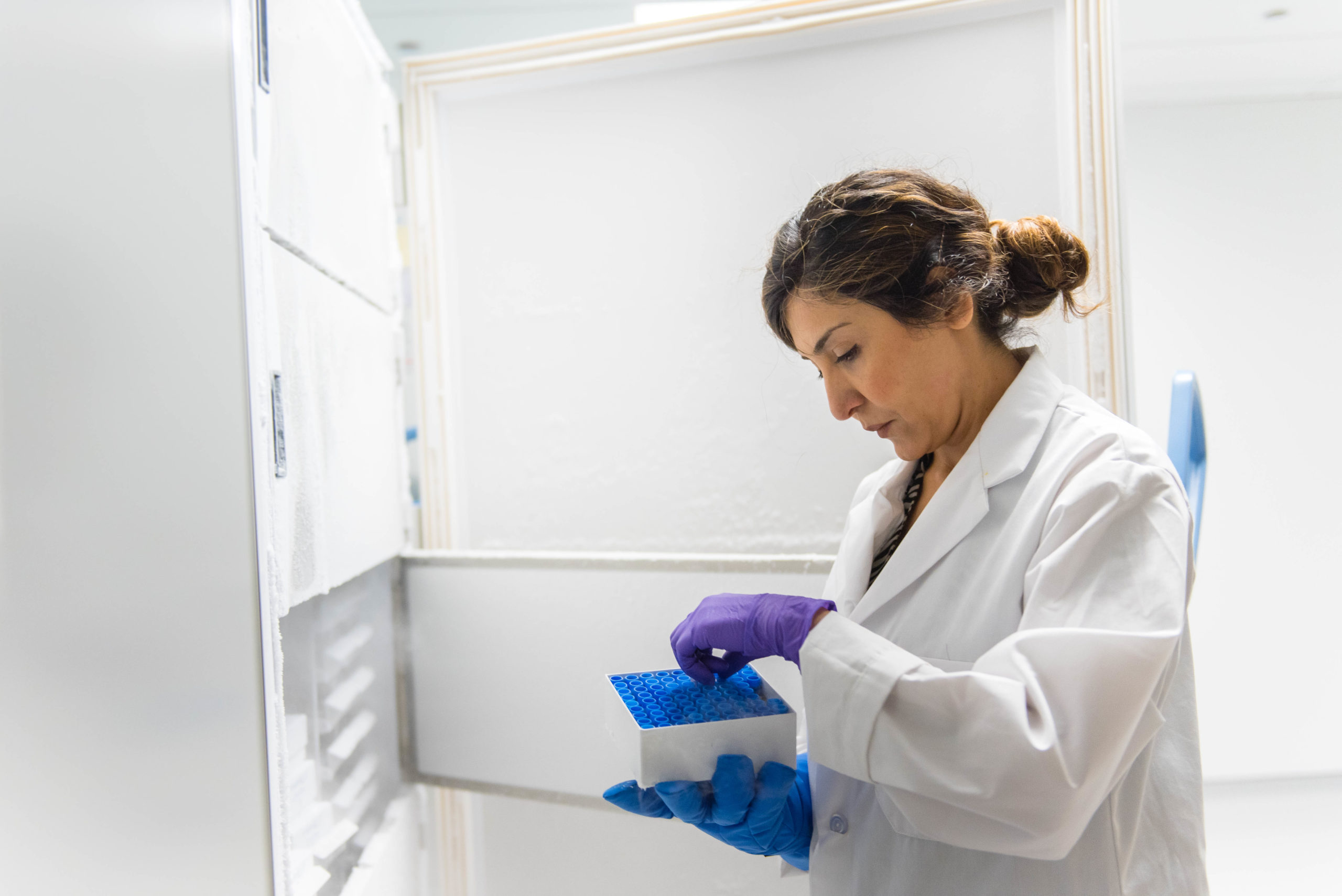Biobank at the Djavad Mowafaghian Centre for Brain Health
The Borgland Family Brain Tissue and DNA Bank (the Biobank) opened in 2015 as a centralized resource for the collection, storage, and distribution of the highest quality of pre-and post-mortem tissue at the Djavad Mowafaghian Centre for Brain Health.
The Biobank’s mission is to provide a comprehensive service for the collection, processing, storage, and rapid retrieval of biospecimens and medical information for approved research projects using a professional and compassionate approach to patient consenting that adheres to the highest standards of research ethics and patient privacy.

Frequently Asked Questions
Below are the answers to some frequently asked questions about the Biobank.
A human biobank (also commonly referred to as a biorepository) is a collection of human biospecimens and associated data. Biospecimens are tissues, blood, body fluids and their derivatives typically collected for diagnosis and/or research projects. The corresponding data are specific information associated with a biospecimen, such as participant and biospecimen information and/or health-related clinical and outcome data.
We are a group of doctors and scientists at the DMCBH located at the University of British Columbia in Vancouver, working together to identify underlying causes for brain-related diseases to help optimize diagnosis and improve treatment. The DMCBH Biobank is run by scientists under the direction of DMCBH Director, Dr. Lynn Raymond. We have received a generous donation from the Borgland Family to support this project.
The DMCBH Biobank is located on the lower level of Djavad Mowafaghian Centre for Brain Health at the University of British Colombia. The Biobank facility is a secured research facility in an access restricted area.
The research coordinator or Biobank coordinator can answer your questions during your study visit or when giving consent to Biobank. You can also email Biobank Administration at info.brainbiobank@ubc.ca for more information.
Unfortunately, the DMCBH Biobank is not able to process brain tissue donations at this time.
If you have arranged for brain donation through a specific study, you must contact the study coordinator, the clinic or your physician.
To donate your body to UBC Body Donation Program, please contact body.program@ubc.ca or (604) 822-2578.
How to get involved
Learn about how to get involved with the biobank.
You may participate in the Biobank if you are 18 years of age or older and can speak and understand English. Participants who have highly contagious diseases (i.e., tuberculosis, hepatitis, HIV), neurological transmissible diseases (i.e., Jacob-Creutzfeldt), and those with blood clotting disorders (hemophilia) may not be able to participate.
If you agree to participate in the Biobank study, we will ask you for:
- A blood sample equivalent to a volume of up to approximately 5 teaspoons (about 25 ml), drawn from a vein in your arm.
- Pinprick blood drops equivalent to 5 blood drops drawn from the fingertip.
- Fecal sample for which participants will be instructed to collect the sample at home and mail it to us. We will provide you with the material, including a mailing kit.
- An oral and/or nasal swab; the oral cavity mucosa or nasal cavity nostril will be sampled by rotating a small swab against the sides of the cavity for 5 seconds.
- Permission to be contacted in the future to ask if you are interested in participating in other studies related to brain health research.
- Access to your Health Care Information: the investigators will collect associated health care information from available resources and this information will be assigned a numerical code and then stored in an electronic database. We may review and use that information for research purposes.
You may withdraw from the Biobank study at any time without giving reasons. If you choose to enter the study and then decide to withdraw at a later time, you have the right to request the withdrawal of your information and/or samples collected during the study. This request will be respected to the greatest extent possible. If you would like to request the withdrawal of your data and/or samples, please contact the Biobank.
Your participation in the DMCBH Biobank study is entirely voluntary. If you wish to participate, you will be asked to read and sign a consent form. If you do not wish to participate, you do not have to provide any reason for your decision and there will be no impact on your medical care.
Scientists who need to access biological samples for their research studies must apply to the Biobank, where a scientific committee assesses the merit of the research. In addition to obtaining approval from the Biobank, scientists must also have their research study approved by a Research Ethics Board (REB) before they receive samples from the Biobank. This means that before studies begin, they must be evaluated by a panel of ethicists. The studies must meet certain strict ethical guidelines and international standards of good medical research practices.
Samples and the associated information will be kept until the samples are used up by research studies or determined to be of poor quality.
No, participants are not financially compensated.
Contact
Please contact the Biobank team if you have any questions or concerns: info.brainbiobank@ubc.ca
Resources and Forms
Relevant Biobank documents can be found below.
List of Specimens
Coming soon.